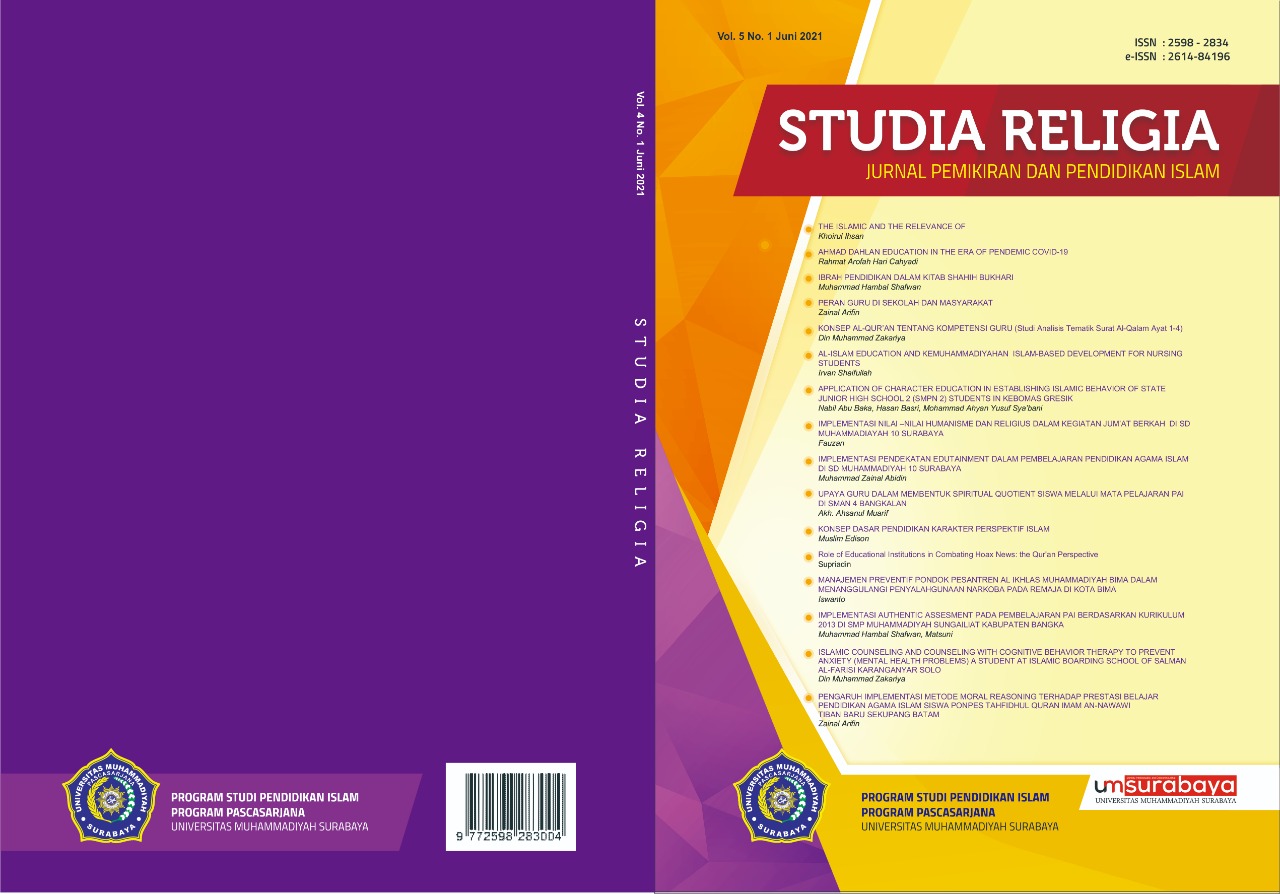THE ISLAMIC AND THE RELEVANCE OF AHMAD DAHLAN EDUCATION IN THE ERA OF PENDEMIC COVID-19
DOI:
https://doi.org/10.30651/sr.v5i1.8933Abstrak
The impact of the Covid-19 pandemic affects psychological conditions and changes in human behavior that are broader in a longer period of time. This also has an impact on the education system in Indonesia. Teachers and students will become accustomed to conducting distance learning interactions by virtual teaching and studying. The auspices of the Muhammadiyah institution implement the WFH (Work From Home) policy for teachers, lecturers to teach and the students to study from home. In education according to Islam is a part of work that must be accounted for humans. Therefore, Islam certainly provides basic concepts about education and it is the responsibility of humans to express them by applying these basic concepts in educational practice. One of the Muslim intellectuals who tried to reconstruct the development of a paradigm that could become the basis of the National Education system was K.H Ahmad Dahlan. Referring to this background, one problem can be drawn related to the thoughts of K.H Ahmad Dahlan about the concept of Islamic education and the relevance of K.H Ahmad Dahlan's thoughts with the concept of Islamic education. K.H Ahmad Dahlan's thoughts on the concept of Islamic Education can be seen from his efforts in integrating the dichotomy of knowledge, maintaining balance, having intellectual, attitude and religious patterns. The purpose of Islamic education which refers to it is to give birth to a whole individual. In order to integrate the two education systems, K.H Ahmad Dahlan adheres more to the education system of western schools which is one step ahead. The thoughts of K.H Ahmad Dahlan have relevance when faced with the context of Islamic education. K.H Ahmad Dahlan's thought about the concept of Islamic education is an alternative way that can be realized to find solutions to educational problems.
Referensi
Aly, Hery Noer. dkk, 2003. Watak Pendidikan Islam, Jakarta: Friska Agung Insani,.
Amirudin, Noor. 2018. Filsafat Pendidikan Islam Konteks Kajian Kekinian. Gresik: Caremedia Coomunication.
Amirudin, Noor, et. all. 2020. Strengthening the Existence of Islamic Education in the Industrial Revolution Era 4.0. Asian Journal of Applied Sciences. Volume 8 (6). DOI: https://doi.org/10.24203/ajas.v8i6.6446
Fadjar, A. Malik, 2005. Holistika Pemikiran Pendidikan, Jakarta: PT Raja Grafindo Persada.
Hasbullah, 1996. Kapita Selekta Pendidikan Islam, Jakarta: PT Raja Grafindo Persada.
Mas’ud, Abdurrahman. dkk, 2001. Paradigma Pendidikan Islam, Cet 1,Yogyakarta: Pustaka pelajar.
Mansur, dkk, 2005. Rekontruksi Sejarah Pendidikan Islam di Indonesia, Jakarta: Depag.
Nata, Abuddin, 2010. Tokoh-Tokoh Pembaharuan Pendidikan Islam di Indonesia, Jakarta.
Nugraha, Adi, 2009. KH. Ahmad Dahlan; Biografi Singkat (18691923-), Yogyakarta: Garasi.
Puar, Yusuf Abdullah, 1989. Perjuangan dan Pengabdian Muhamadiyah, Jakarta: Pustaka Antara.
Sayekti,Lina.et all. (2019) Formulasi Model Perkuliahan Daring Sebagai Upaya Menekan Disparitas Kualitas Perguruan Tinggi. Walisongo Journal of Information Technology, Vol. 1 No. 2
Wirjosukarto, Amir Hamzah, 1985. Pembaharuan Pendidikan dan PengajaranIslam oleh Pergerakan Muhammadiyah, Jember: Universitas Muhammadiyah Jember.
Yunus, Mahmud, 1996. Sejarah Pendidikan Islam di Indonesia, Jakarta: PT Hidakarya Agung.
Zahrotunni’mah. (2020). Langkah Taktis Pemerintah Daerah Dalam Pencegahan Penyebaran Virus Corona COVID-19 di Indonesia. Jurnal Sosial dan Budaya Syar’i Vol. 7 No. 3 (2020), pp.247-260, DOI: 10.15408/sjsbs.v7i3.15103.
Zuhairini, dkk, 1991. Filsafat Pendidikan Islam, Cet 2, Jakarta: Bumi Aksara.
Zuhairini, dkk, Sejarah Pendidikan Islam, Jakarta :IAIN Press, 1986.
Unduhan
Diterbitkan
Terbitan
Bagian
Lisensi
Penulis tetap memegang hak atas karyanya dan memberikan hak publikasi pertama kepada jurnal ini yang secara simultan karya tersebut dilisensikan di bawah:
Creative Commons Attribution-NonCommercial 4.0 International License









